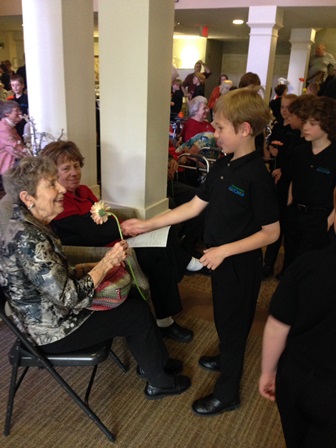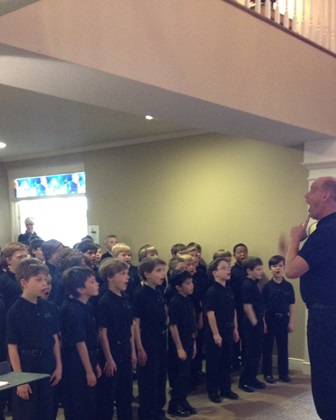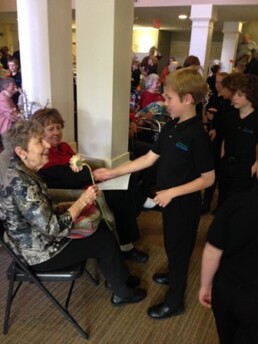Ecumen Meadows in Worthington Gets Grant To Fund Strength-Training Program for Seniors
Ecumen Meadows in Worthington, Minn., has received a $4,500 grant from the Worthington Regional Health Care Foundation to fund exercise equipment and personal training for residents and area seniors aimed at preventing falls and increasing independence.
Nancy Garvin, Ecumen Meadows housing manager, said residents, their families and staff already have raised about $3,000 to support a strength-training exercise program. The addition of the grant money will allow purchase of a new step exercise machine specifically for seniors, fund a year-long contract with a personal trainer and add additional exercise equipment such as hand weights, stretch bands and exercise balls.
“There is such a high demand for a program like this from our residents and other seniors in the area,” Garvin said. “We’re very grateful for the foundation’s recognition of this need and their generous financial support. Strength training can prevent falls and increase mobility. We have very active seniors here, and this will allow us to have exercise sessions four times a week.”
She said Ecumen Meadows serves 120 residents, plus the program also will be open to the entire Worthington community. “Maintaining their strength will allow seniors in the community to remain in their homes as long as possible,” Garvin said.
Pat Henderschiedt, representing the Worthington Regional Health Care Foundation, presented the $4,500 check to a group of Ecumen Meadows regular exercise participants on May 12.
Planning is now underway to start the four-times-per-week Senior Wellness Program this summer. For more information, call Cheryl Dinsmore, life enrichment manager at Ecumen Meadows, at 507-343-7157.
The Dubious Hero of Mother's Day by Jim Klobuchar
Ecumen blogger Jim Klobuchar worked extra hard this Mother's Day and recounts it as only he can.
Last Week's Top 5 Blog Posts - May 12
In case you missed one, here are the blog posts our online visitors found most interesting last week:
On National Nurses Day: Honoring Anne Diekmann, Exemplary Ecumen Nurse
What It's Like to be 100 Years Old, in 10 Charts
The Minnesota Boychoir Brings Early Mother's Day Joy to the Residents at Ecumen Lakeview Commons
Changing Aging Video: Ashley, LPN at Ecumen Bethany Community
Young Man's 89-Year-Old Prom Date Gets a Standing Ovation
To read more Changing Aging blog posts or to learn more about Ecumen, please visit ecumen.org.
The Minnesota Boychoir Brings Early Mother’s Day Joy To the Residents at Ecumen Lakeview Commons
The Minnesota Boychoir performed an early Mother’s Day concert at Ecumen Lakeview Commons on Saturday, May 3, to a packed house of residents, guests and caregivers.
The Cantar and Cantando ensembles performed “Why We Sing,” including “Pie Jesu” and “Wynken, Blynken and Nod,” and closing with “I’ll Make the Difference.” The choir members handed out gerbera daisies to the women in the audience following their performance.
“My grandma left with two daisies and the biggest smile on her face!” said Amy Williams, who is Ecumen’s major gifts officer. “The residents had a fantastic time. There was plenty of toe-tapping, clapping, and even some shouts of encouragement from the audience. The choirs were really fantastic and the flowers they gave at the end of the program were lovely and meaningful.”
Jen Rasmussen, the activity director at Ecumen Lakeview Commons, said residents are still talking about how great the boys could sing at such a young age and how cute they all are. “We had 70 boys in our lobby for almost three hours and every single one of them was a class act,” Jen said. “They were so very polite, quiet and sweet to the residents.”
The Boychoir “welcomes and embraces members of diverse faiths, races, and social and economic backgrounds.” Boys ages 7 to 18 come from communities throughout the Twin Cities metropolitan area and perform in one of three ensemble groups – Cantar, Cantabile or Allegro – and are led by artistic director Mark S. Johnson.
“This is a good place to be for a lot of boys. Lots of kids search for a place to be – to belong. Here, boys with a common interest in singing can hang out, become friends and grow together, both as singers and as young men,” said Johnson, who was quoted in the Boychoir’s program.
The choir, founded in 1962, is celebrating its 50th anniversary season of providing choral music training, education and performance opportunities. Upcoming free concerts will be held in St. Paul on Saturday, May 31, and Minneapolis on Sunday, June 8. Visit www.boychoir.org for more information.
Ecumen Lakeview Commons in Maplewood, Minn., offers enriching activities and performances for residents and their families every week. To learn more about upcoming events or how to volunteer, please call 651-770-1111 or visit www.lakeviewcommons.org.

Changing Aging Video: Ashley, LPN at Ecumen Bethany Community
"It's a good variety. A lot of people think nursing can be the same thing every day when you work in a nursing home. But it's completely different. You have different challenges every day and you definately need to stay on the ball. It's just great - I love it!"
What it’s Like to be 100 Years Old, in 10 Charts
Interesting findings from two studies on centenarians.
On National Nurses Day: Honoring Anne Diekmann, Exemplary Ecumen Nurse
Anne is one of Ecumen’s approximately 2,800 nurses and nursing assistants. Today we honor them — and all nurses — for the care they give so selflessly and the positive difference they make in people’s lives every day. Read more about why Anne chose working in senior care over a hospital.
Last Week's Top 5 Blog Posts - May 5
In case you missed them, here are the blog posts our online visitors found most interesting last week:
A Handy Guide to Communicating With People Who Have Dementia
Young Man's 89-Year-Old Prom Date Gets a Standing Ovation
Jane's Beautiful Birthday Dream Grows at Ecumen of Litchfield
Most Centenarians Feel Positive - And a Lot Younger Than They Are
To read for Changing Aging blog posts or to learn more about Ecumen, please visit ecumen.org.
Bertha Smith, First Black Teacher in Minneapolis School District, Remembered as Pioneer and Role Model
Bertha Smith, the first black teacher in the Minneapolis School District, is being remembered by local leaders as an extraordinary educator, tireless volunteer and dedicated community advocate. Smith, a resident at Ecumen Prairie Lodge, passed away on Friday, April 18, at the age of 94. Our condolences to Bertha's family, friends and all those who were influenced by her.
Ecumen is honored to share Bertha's story, as told in this Star Tribune obituary, "Bertha Smith Broke Down Barriers in Minneapolis Schools."
Young Man's 89-Year-Old Prom Date Gets a Standing Ovation
Austin Dennison didn't ask his high school sweetheart to prom. Nor did he ask a celebrity via Twitter. Austin, a "kind of fellow who looks like he just stepped out of central casting," asked his 89-year-old great grandmother to his senior prom. And she said yes. You can read the full story in this Fox News Article: "Teenager Takes His Great-Grandmother to Prom."




